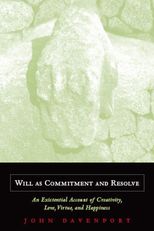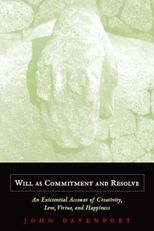Will as Commitment and Resolve: An Existential Account of Creativity, Love, Virtue, and Happiness
Will as Commitment and Resolve: An Existential Account of Creativity, Love, Virtue, and Happiness
Cite
Abstract
In contemporary philosophy, the will is often regarded as a sheer philosophical fiction. In this book, the author argues not only that the will is the central power of human agency that makes decisions and forms intentions, but also that it includes the capacity to generate new motivation different in structure from prepurposive desires. The concept of “projective motivation” is the central innovation in the existential account of the everyday notion of striving will. Beginning with the contrast between “eastern” and “western” attitudes toward assertive willing, the author traces the lineage of the idea of projective motivation from NeoPlatonic and Christian conceptions of divine motivation to Scotus, Kant, Marx, Arendt, and Levinas. Rich with historical detail, this book includes an extended examination of Platonic and Aristotelian eudaimonist theories of human motivation. Drawing on contemporary critiques of egoism, it argues that happiness is primarily a byproduct of activities and pursuits aimed at other agent-transcending goods for their own sake. In particular, the motives in virtues and in the practices as defined by Alasdair MacIntyre are projective rather than eudaimonist. This theory is supported by analyses of radical evil, accounts of intrinsic motivation in existential psychology, and contemporary theories of identity-forming commitment in analytic moral psychology. Following Viktor Frankl, Joseph Raz, and others, the book argues that Harry Frankfurt's conception of caring requires objective values worth caring about, which serve as rational grounds for projecting new final ends. The argument concludes with a taxonomy of values or goods, devotion to which can make life meaningful for us.
-
Front Matter
-
I The Idea of Willing as Projective Motivation
-
II The Existential Critique of Eudaimonism
-
III Case Studies for the Existential Will as Projective Motivation
-
9
Divine and Human Creativity: From Plato to Levinas
John Davenport
-
10
Radical Evil and Projective Strength of Will
John Davenport
-
11
Scotus and Kant: The Moral Will and Its Limits
John Davenport
-
12
Existential Psychology and Intrinsic Motivation: Deci, Maslow, and Frankl
John Davenport
-
13
Caring, Aretaic Commitment, and Existential Resolve
John Davenport
-
14
An Existential Objectivist Account of What Is Worth Caring About
John Davenport
-
Conclusion: The Danger of Willfulness Revisited
John Davenport
-
9
Divine and Human Creativity: From Plato to Levinas
-
End Matter
Sign in
Personal account
- Sign in with email/username & password
- Get email alerts
- Save searches
- Purchase content
- Activate your purchase/trial code
Institutional access
-
Sign in through your institution
- Sign in with a library card Sign in with username/password Recommend to your librarian
Institutional account management
Sign in as administratorPurchase
Our books are available by subscription or purchase to libraries and institutions.
Purchasing information| Month: | Total Views: |
|---|---|
| October 2022 | 1 |
| November 2022 | 2 |
| November 2022 | 3 |
| November 2022 | 3 |
| November 2022 | 3 |
| November 2022 | 2 |
| November 2022 | 3 |
| November 2022 | 3 |
| November 2022 | 2 |
| November 2022 | 3 |
| November 2022 | 3 |
| December 2022 | 1 |
| March 2023 | 5 |
| March 2023 | 1 |
| April 2023 | 1 |
| April 2023 | 1 |
| July 2023 | 3 |
| July 2023 | 2 |
| July 2023 | 3 |
| July 2023 | 2 |
| July 2023 | 2 |
| July 2023 | 3 |
| July 2023 | 3 |
| July 2023 | 5 |
| July 2023 | 2 |
| July 2023 | 2 |
| July 2023 | 3 |
| July 2023 | 2 |
| July 2023 | 2 |
| July 2023 | 2 |
| July 2023 | 2 |
| July 2023 | 2 |
| July 2023 | 4 |
| July 2023 | 4 |
| July 2023 | 2 |
| July 2023 | 2 |
| July 2023 | 3 |
| July 2023 | 2 |
| July 2023 | 4 |
| August 2023 | 1 |
| October 2023 | 2 |
| November 2023 | 1 |
| November 2023 | 1 |
| November 2023 | 1 |
| November 2023 | 1 |
| December 2023 | 2 |
| December 2023 | 3 |
| February 2024 | 3 |
| February 2024 | 2 |
| February 2024 | 2 |
| February 2024 | 2 |
| February 2024 | 3 |
| February 2024 | 4 |
| February 2024 | 8 |
| February 2024 | 4 |
| February 2024 | 2 |
| February 2024 | 1 |
| February 2024 | 2 |
| February 2024 | 4 |
| March 2024 | 5 |
| March 2024 | 1 |
| April 2024 | 3 |




Get help with access
Institutional access
Access to content on Oxford Academic is often provided through institutional subscriptions and purchases. If you are a member of an institution with an active account, you may be able to access content in one of the following ways:
IP based access
Typically, access is provided across an institutional network to a range of IP addresses. This authentication occurs automatically, and it is not possible to sign out of an IP authenticated account.
Sign in through your institution
Choose this option to get remote access when outside your institution. Shibboleth/Open Athens technology is used to provide single sign-on between your institution’s website and Oxford Academic.
If your institution is not listed or you cannot sign in to your institution’s website, please contact your librarian or administrator.
Sign in with a library card
Enter your library card number to sign in. If you cannot sign in, please contact your librarian.
Society Members
Society member access to a journal is achieved in one of the following ways:
Sign in through society site
Many societies offer single sign-on between the society website and Oxford Academic. If you see ‘Sign in through society site’ in the sign in pane within a journal:
If you do not have a society account or have forgotten your username or password, please contact your society.
Sign in using a personal account
Some societies use Oxford Academic personal accounts to provide access to their members. See below.
Personal account
A personal account can be used to get email alerts, save searches, purchase content, and activate subscriptions.
Some societies use Oxford Academic personal accounts to provide access to their members.
Viewing your signed in accounts
Click the account icon in the top right to:
Signed in but can't access content
Oxford Academic is home to a wide variety of products. The institutional subscription may not cover the content that you are trying to access. If you believe you should have access to that content, please contact your librarian.
Institutional account management
For librarians and administrators, your personal account also provides access to institutional account management. Here you will find options to view and activate subscriptions, manage institutional settings and access options, access usage statistics, and more.